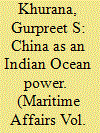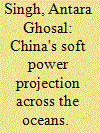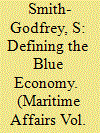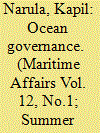| Srl | Item |
| 1 |
ID:
147400


|
|
|
|
|
| Summary/Abstract |
Lately, China’s politico-diplomatic and economic engagements with the Indian Ocean littorals, and its naval activities in the region, have become increasingly conspicuous. This paper aims to undertake a comprehensive assessment, not only of the trends, but also of the underlying factors shaping these trends, which makes China potentially an Indian Ocean power. The underlying factors examined are China's economic, strategic and geopolitical objectives and imperatives, and its national strategy – including its maritime military strategy – in the region. The paper concludes with a prognosis, and its implications for the region and India.
|
|
|
|
|
|
|
|
|
|
|
|
|
|
|
|
| 2 |
ID:
147402


|
|
|
|
|
| Summary/Abstract |
China's cruise industry has been growing rapidly since 2006. In 2015, China's cruise market became the largest in Asia and the second largest in the world. This paper reviews the latest developments of China's cruise industry, analyses the challenges in cruise ports, cruise lines and law and regulations, and forecasts the trends of China's cruise industry. The paper concludes that the China's cruise industry will enter into its golden years in the coming decades.
|
|
|
|
|
|
|
|
|
|
|
|
|
|
|
|
| 3 |
ID:
147401


|
|
|
|
|
| Summary/Abstract |
At a time when the focus of most of the academic research on China is on the geopolitical developments in the South China Sea and the panning out of the United States' “next phase of rebalance strategy” in Asia, this paper draws attention to China's charm offensive across the Atlantic. It explores the political undertones of China's soft power push in the developed western world, especially in the context of its evolving relationship with the United States. In the final section, the paper tracks the implication of these developments on India and Indian policymaking.
|
|
|
|
|
|
|
|
|
|
|
|
|
|
|
|
| 4 |
ID:
147404


|
|
|
|
|
| Summary/Abstract |
Oceans are increasingly gaining in importance in terms of enabling international trade via linking sellers and buyers. The behaviour patterns of such linking enablers on the oceans are receiving more attention from a regulatory and economic perspective as the relationship between land and ocean evolves in its role and importance. The “Blue Economy” as a concept finds its origin against this background. A literature review is undertaken to analyse an appropriate definition for the Blue Economy. These definitions are analysed in terms of the minimum criteria which are necessary for a Blue Economy. The paper also attempts to structure various types of activities which are associated with ocean services. It is done with a view to identify what one may perceive as the focus areas for the growth of the Blue Economy.
|
|
|
|
|
|
|
|
|
|
|
|
|
|
|
|
| 5 |
ID:
147403


|
|
|
|
|
| Summary/Abstract |
Sea-launched land-attack cruise missile (SLCM) strikes, one of the most common expeditionary force projection tasks, is traditionally performed by major navies using long-range offensive platforms such as major surface warships and nuclear submarines prized for their range, endurance and capacity. By contrast, small navies are deemed unsuited for such a role, since they typically comprise small warships and conventional submarines, which thereby suit them for peacetime constabulary and wartime sea denial and defensive sea control missions. However, the Russian Navy's use of such assets in late 2015 to launch SLCM strikes against Islamic State (Daesh) targets in Syria demonstrates that expeditionary force projection is not an exclusive province of major navies. Attendant challenges such as the lack of intelligence, surveillance and reconnaissance (ISR) capabilities may limit such roles by small navies but will still potentially spark greater interest amongst them in acquiring SLCMs to bolster their deterrent capabilities.
|
|
|
|
|
|
|
|
|
|
|
|
|
|
|
|
| 6 |
ID:
147406


|
|
|
|
|
| Summary/Abstract |
The Indian Ocean covers 20% of the Earth and is ranked as the third largest water body in the world. It has various matters related to maritime affairs which have to be resolved and policies that need to be implemented to ensure maritime safety and security of the littoral countries. In this context, the formulation of a common maritime policy will be beneficial in safeguarding not only the states but also the natural resources in the region. This paper demonstrates that the use of public diplomacy is a beneficial tool in formulating a common maritime policy. It also argues that this tool is useful in influencing public and governments in cooperating towards formulating and implementing policies and strategies that are important for maritime safety and security in the Indian Ocean Region.
|
|
|
|
|
|
|
|
|
|
|
|
|
|
|
|
| 7 |
ID:
147405


|
|
|
|
|
| Summary/Abstract |
Marine ecosystems are a rich source of biodiversity, and healthy oceans are integral to the well-being of the ecosystem. Marine biological diversity, which is unique, is, however, unprotected and is threatened by various stressors on the oceans. The paper outlines the existing ocean governance framework and analyses the gaps and limitations in addressing the conservation and sustainable use of marine biological diversity beyond areas of national jurisdiction (BBNJ). It discusses the ongoing mechanisms to address issues related to BBNJ, presents the deliberations and arguments and explores the nature of future agreement for protection of marine biological diversity in areas beyond national jurisdiction. The way ahead for strengthening of institutional arrangements to address existing ocean governance gaps is also discussed. The paper concludes that there is a need for further international cooperation and global support for ensuring conservation of BBNJ.
|
|
|
|
|
|
|
|
|
|
|
|
|
|
|
|
| 8 |
ID:
147399


|
|
|
|
|
| Summary/Abstract |
Between the American rebalance strategy and Chinese Maritime Silk Road initiative, India is increasingly pressed to formulate a maritime strategy that ideally meets Indian economic and strategic objectives. This is generating major policy dilemmas for India stemming from the attraction of economic integration led by China on the one hand, versus the attraction of strategic integration offered by the United States on the other hand. This paper suggests that between these binary options, there are both opportunities and challenges for India, calling for fine-grained policymaking. The notional concept of an India–US–China maritime triangle is useful in sifting through the choices before India to meet its ambitions of development as well as retain and improve its strategic influence in the Indian Ocean and beyond.
|
|
|
|
|
|
|
|
|
|
|
|
|
|
|
|